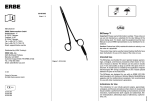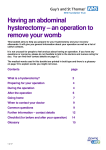Download Changing Scope of Practice – A User's Guide
Transcript
Changing Scope of Practice – A Physician’s Guide In accordance with the annual renewal form, physicians must report to the College when they have changed their scope of practice or that they intend to change their scope of practice. The College’s Changing Scope of Practice policy outlines the College’s expectations of physicians who have changed or will be changing their scope of practice and who do not have the necessary training and/or experience to practise competently in the new area of practice. The College has put together this guide to help you understand how it determines whether a physician has undergone a change in scope of practice and what the College expects of physicians who are contemplating a change or have changed theirs scope of practice. This guide is organized by a series of Frequently Asked Questions (FAQs) followed by some examples of changes in scope of practice and the training required. FAQs How does the College define scope of practice? What does the College consider a significant change in scope of practice? How do I know if a potential change is significant or if it is simply a normal evolution of my practice? I received my general license before 1993. Doesn’t a general license allow me to practice in any area that I want? What will happen if I am required to submit a Change in Scope Application? I have determined that I have changed my scope of practice since 2002 and I have to fill out the Application for Physicians who HAVE CHANGED their scope of practice. What will happen next? I am planning to change my scope of practice and I have to fill out the Application for Physicians who are PLANNING TO CHANGE their scope of practice. What will happen next? How will the College determine if proposed or completed training is adequate? How long does the training need to be? How do I find a supervisor? Do I have to pay for my change of scope? I want to move from my urban practice to a rural one. Why might the College consider this a change of scope? Can you give me some examples of what physicians have gone through to change their scope? How does the College define scope of practice? The definition of scope of practice is as follows: 1. 2. Every physician’s scope of practice is unique. A physician’s scope of practice is determined by the patients the physician cares for, the procedures performed, the treatments provided, and the practice environment. A physician’s ability to perform competently in his or her scope of practice is determined by the physician’s knowledge, skills and judgment, which are developed through training and experience in that scope of practice. 3. What does the College consider a change in scope of practice? A change of scope of practice occurs when there have been significant changes to any of the elements set out in part 2 of the definition. If the patient population you care for, the procedures that you perform, the treatments you provide, or the environment in which you see patients has changed in a significant way, the College may find that you have changed your scope of practice. Key to this concept is what the College considers “significant.” In general, if you have changed your practice such that you are practising outside of what would be considered the usual scope of practice for your discipline, then your scope of practice may have changed significantly. How do I know if a potential change is significant or if it is simply a normal evolution of my practice? The College has an algorithm on-line that you can go through to determine whether or not you should submit a Change in Scope of Practice application. In general, the algorithm will identify a change as significant if: i. You are completely changing your type of practice (For example you are a surgeon who wants to go into general practice) OR ii. You are adding something in to your practice that you have a. not done before AND b. it is not something that is considered a usual part of your discipline AND c. Most physicians in your discipline are not changing their practice in this way. (For example you are a pediatrician who wants to start working in an Emergency Department caring for adult patients) OR iii. You are focusing your practice in an area in which you have not been active for at least three years. (For example you are a GP who was previously trained in sigmoidoscopy, but have not done any for the past five years and want to start doing it again.) The algorithm is simple and should take you no more than a few minutes to go through. Alternatively, you can speak to a staff member of the College in the Physician Advisory Service at (416) 967-2606 or (800) 268-7096 Ext. 606, who will help you go through the algorithm. I received my general license before 1993. Doesn’t a general license allow me to practice in any area that I want? This is a common misconception. Every member of the College has restrictions to their certificate of registration (license). In fact, every certificate has terms and conditions that states that the member may practice only in the areas of medicine in which the member is educated and experienced. Thus, there is no such thing as a “general license” regardless of how long you have been a physician in this province. What will happen if I am required to submit a Change in Scope of Practice Application? Currently, there are two applications. One application is for those physicians who have changed their scope of practice since 2003 and didn’t realize that they had to report this change. The other application is for physicians who are intending to change their scope of practice. Every application will be individually reviewed in order to assess the training and experience that a physician has or needs in order to practice safely in their new scope of practice. Ultimately, all physicians who have made or are intending to make a significant change in the scope of their practice will have a College-directed assessment of their practice by a peer to ensure that the physician is practicing to the expected standard in the new scope of practice. The path to this assessment, however, will be slightly different for the two scenarios. I have determined that I have changed my scope of practice since 2002 and I have to fill out the Application for Physicians who HAVE CHANGED their scope of practice. What will happen next? Every application is reviewed by staff and physicians at the College. If you have already made a change in your scope of practice, you can expect that the College will direct an assessment of your new scope of practice. Some physicians may have already had an assessment of their new area of practice through other College processes or by previously reporting a change in the scope of their practice. These physicians need not expect another assessment. The College anticipates that as a result of the new mandatory questions in the annual renewal form regarding Change in Scope of Practice that there may be quite a number of physicians who report that they have changed their scope of practice. As such, we anticipate that there may be a large number of assessments to be completed. College staff will prioritize the assessments based on the following factors: i. ii. iii. The “risk” of the new area of practice; The amount (duration and type) of training undertaken; The degree of ongoing collegial support or mentoring. It may be at least a few months before an assessment takes place. The assessment is likely to be similar to the College’s peer assessment program, where a peer comes to your office or clinic and reviews documentation and discusses care with you. For procedural changes, there may also be an observational component to the assessment, where the assessor will observe you performing the new procedures. I am planning to change my scope of practice and I have to fill out the Application for Physicians who are PLANNING TO CHANGE their scope of practice. What will happen next? Ultimately, physicians who are planning to change their scope of practice will need to undergo a College-appointed assessment. Before this occurs, the College will review the application to determine if the physician requires training in the new area of practice. If training has already been completed, the College will review the training to ensure it seems adequate. If the training is determined to be inadequate, further training and/or supervision may be required before the assessment can take place. If training has yet to be completed, the physician will have to submit a training proposal. Once approved, training must be completed before the assessment can take place. How will the College determine if the proposed or completed training is adequate? Training will be reviewed on an individual basis. Determining that training is adequate will be based upon the accepted educational principle of graded responsibility. This model is similar to that which is used in undergraduate and postgraduate education. As supervisors determine competence, trainees are given more and more independence. Training generally will involve some initial educational experience where you are learning in an environment where someone else is the patient’s Most Responsible Physician (MRP). This is called High Supervision. Once the supervisor is content that the learner is competent to practice in a less supervised environment, the trainee will be allowed to engage in the practice, as MRP with supervision. After a period of time, the supervisor will recommend to the College that the physician is ready for independent practice in the area and the assessment will be arranged. For example, let’s say you have been practicing Emergency Medicine for your 15-year career and want to change to family medicine. While there are many areas of overlap between the two disciplines, some training would be required. The College would require you to work with a family physician supervisor in their practice, with the supervisor acting as MRP until the supervisor is content that you can safely practice in a less supervised environment. Once you receive the go-ahead from the supervisor, you may start practicing in your own practice under supervision. This means that a supervisor will review your practice on a regular basis (generally every two to four weeks) and ensure that you are practicing safely, as well as act as a resource for you to help you settle into your new practice. These practice reviews will generally consist of reviewing documentation on some random charts to provide you with feedback on care and documentation. For procedural changes in scope, the supervision may also involve observing you perform the procedure in your own environment. Once the supervisor is content that you are practicing safely, s/he will submit a final report to the College and an assessment will be carried out. If that assessment is satisfactory, then your change of scope is complete. Although usually training takes place in a “linear” fashion such as this (High supervision, low supervision, independent practice), there may be situations where training and practice can take place at the same time. All cases will be considered individually. How long does the training need to be? As every case will be reviewed individually, this question is impossible to answer. Obviously the bigger the change in scope, the longer the training will be. For example, if you are a pathologist and want to start working in a walk-in clinic, your training would have to be significant – along the lines of a family medicine residency. On the other hand, if you are a general surgeon and you want to start performing hysterectomies as you are moving to a smaller community, the training would be different. Having mastered concepts and principles of surgery, learning a new procedure from a surgical colleague would be much simpler. Key to determining the length of training will be the input from the supervisor. The supervisor has a big responsibility in determining that their trainee is capable of practicing in a less supervised environment and then independently. Ultimately, the validity of the supervisor’s assessment will be tested through the College-directed assessment. Keep in mind that once the supervisor has determined that you are capable of working in a lower level supervision environment, you will be working as the patient’s MRP. At this point, the supervisor meets regularly with you to not only ensure that you are practicing safely, but to assist and mentor you in your new area of practice. The supervisor will have the ability to identify and recommend areas which need improvement, as well as recommend educational resources for you. How do I find a supervisor? Physicians who wish to change their scope of practice are responsible for finding their own supervisors. A supervisor should be a colleague who practices in the same scope into which you are trying to change. They must be in good standing with the College. In general they should be respected in the field, experienced and willing to help you. Desirable qualities of supervisors are outlined in the College’s Guidelines for Supervision, which are available on the CPSO website. These guidelines are currently being updated and once ready, the revised version will be posted on the website. Supervisors will have to sign a supervisor’s agreement or undertaking, in which they commit to providing you with ongoing education and the College with regular feedback on your progress. While supervisors have the right to expect remuneration, often supervisors will agree to these duties as an act of professional courtesy. Do I have to pay for my change of scope? Physicians who wish to change their scope of practice must pay for all costs associated with training, supervision and assessment. The cost of the training and supervision will be quite variable depending on the courses taken, the cost of supervision and the length of the training necessary. Physicians are responsible for paying for their College-directed final assessment, which currently stands at $1,400. I want to move from my urban practice to a rural one. Why might the College consider this a change of scope? Our ability to practice in a safe and competent manner depends on many variables. Moving from an urban to a rural environment may present unforeseen changes in the way that you practice. For example, you may not have easy access to specialists, facilities, diagnostic or social services that you are likely used to in an urban practice. While the patients and their problems may be similar, you may be forced to practice in a different way. While the College would likely not expect you to retrain in any way in this scenario, the College would expect that you obtain a supervisor to carry on another role. In this scenario the supervisor would act more as a mentor or resource person with whom you could meet or chat on a regular basis in order to help you to settle in to your new environment. Can you give me some examples of what physicians have gone through to change their scope? 1. A physician practiced as an Emergency Physician for 20 years and decided to change his practice to psychotherapy. The physician obtained training through a University psychiatry residency program and spent one year as a fellow in a selfdirected program. During this period there was a high level of supervision. The physician then opened his own practice and there continued to be supervision, but a lower level than there was in the residency program. After a period of time, the physician was assessed by the College and was found to be practicing competently in the new area of practice. 2. An Emergency Physician wished to change his scope of practice to psychotherapy. Prior to requesting the change in scope of practice, the physician had done a fair amount of training in psychotherapy. As part of the change in scope of practice process, the physician worked a few times with a supervisor in an environment where there was a high-level of supervision. The supervisor was quickly convinced that the physician was performing adequately. The physician quickly moved to an environment where there was a lower level of supervision. During this period the physician met with his supervisor/mentor regularly until an assessment was recommended. The results of this assessment demonstrated that the physician was practicing competently in the new scope of practice. 3. A senior surgeon retired from her surgical practice and wanted to change her scope of practice to family medicine where she would practice part-time in a small, under-serviced community. In order to do so, the physician would be required to practise in an environment of high supervision for an extended period of time because the surgical specialty in which she had been practising was not similar to family practice. The surgeon decided to abandon the change in scope of practice request. 4. A family physician had been working in an administrative position for more than 10 years. The physician decided to go back to clinical practice. During the administrative time, she had worked approximately once per month in a walk-in clinic. As the physician had grounding in family medicine, she entered into a supervised practice at a low level of supervision after only a few days of high supervision. The supervisors were the physicians with whom the doctor would be working in her new practice. After a few months of low supervision, the physician was assessed and was practicing without any difficulties. 5. A family physician had been assisting surgery in a free-standing surgical facility that specializes in one type of surgery for a couple of years. Both the surgical staff at the facility and the family physician proposed that the family physician had enough experience that he could be trained to be the primary surgeon in the most common and least risky form of the procedures done at this facility. Thus the family physician desired to change his scope of practice to one that was primarily surgical. A training proposal was accepted that provided for an initial high-level of supervision, followed by ongoing supervision of pre-operative, intra-operative and post-operative care for this procedure. Once the supervising surgeons were content that the family physician had acquired adequate knowledge and skills, the physician was assessed by a College-appointed surgeon who deemed that the family physician was performing that procedure competently. As such, the family physician was granted the change of scope to perform only that specific procedure in only that facility.















